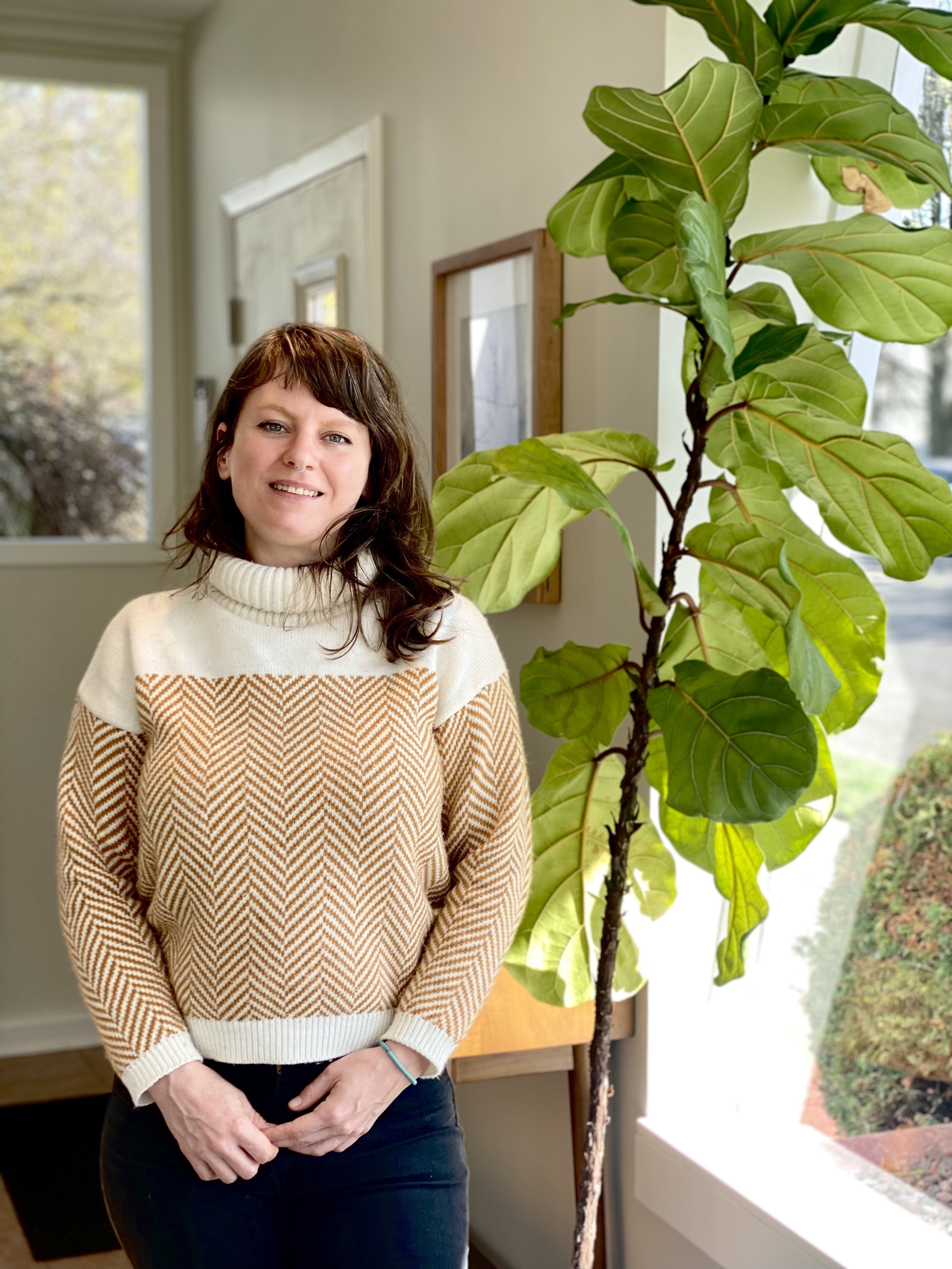Erin (she/her) has been part of the Turning Pointe team since last spring and we couldn’t agree with her patients more: we’re so lucky to have her!
Erin has been practicing acupuncture since 2019, getting her start with the Acupuncture Relief Project where she provided free acupuncture to people in rural Nepal. After returning to the United States, she has since worked at various clinics around Portland and the Willamette Valley.
Her style has naturally evolved towards musculoskeletal and orthopedic cases, as well as addiction and trauma healing. She embraces the holistic Chinese Medicine approach of seeing no distinction between emotional, mental, and physical health.
Read on to learn more about how Erin began her acupuncture studies, what she would say to someone hesitant to try acupuncture or cupping, her favorite Chinese herb, and more!
Q: What attracted you to acupuncture and cupping therapy?
Erin Cranford, LAc, MAcOM in the Turning Pointe lobby.
A: My engagement with acupuncture began when I was in my early 20s. I was hoping to find a way to address some pretty serious fatigue and burnout I was experiencing, as someone who had worked full time and been a full time student since the age of sixteen.
I remember my first session. My practitioner was so kind and present, and asked me so many interesting questions! I loved how seen I felt. Once I was resting on the table with the needles in, I very quickly slipped into a deep relaxation, not quite awake, not quite asleep — like a waking dream. The relaxation stayed with me long after the treatment, I felt so calm and present for days! It was amazing, and a new experience for me.
Over the years I’ve continued with regular acupuncture treatments, it has helped me in a few different ways. My back pain, insomnia, and anxiety have all been alleviated thanks to acupuncture. Additionally, I’ve gradually learned how to feel safe in my body, which is a very special gift.
Acupuncture initiated a curiosity in me that has deeply influenced my life path. What do the needles actually do? Why do they do what they do? What is real healing? Is there an end point? I’m grateful to be in a field where I can really dive into these questions. It’s inspiring and fun to me. I enjoy studying (and restudying) human anatomy, Chinese medicine theory, Chinese herbs, and everything else in between. This career requires a lot of knowledge, and my mind eats it up. As one of my teachers in Chinese Medicine school told us once: “Now that you’re in acupuncture school, you will never be bored again.” Meaning: there will never, ever, be a lack of things to study and learn in this field.
Erin treating a patient at the clinic.
Q: How do you describe your approach and care style?
A: I aim to meet each patient where they are, adapting each treatment to their specific pattern and body. I usually do a mix of established point protocols and on-the-spot (intuitive) needling to address each patients’ needs. This will often look like distal needling (needles into the hands and feet) to support and connect the entire body - energetic, electrical, emotional, and spiritual - as well as local needling into areas of pain to encourage healthy muscle release, joint support, and more.
Some patients prefer a higher quantity of needles and some people do better with less. I check in often as I needle and observe how the needles are received — does the patient jump easily? Are they especially ticklish? Do they breathe a sigh of relief? Does their energy sink down as soon as they’re on the table?
I usually end each treatment with cups and/or body work of some kind. I find that touching a patient in some way, even if it only involves a quick foot massage or acupressure onto a specific acupuncture point, will help encourage better qi/energy flow, and is a nice transition back from resting with needles into moving, waking life again.
Q: What would you say to someone hesitant to try acupuncture or cupping therapy?
A: To someone new to acupuncture, I would first explain to them what it does, from a western medical perspective: When sterile needles are put into our bodies, the alarm bells go off, and our immune system kicks in, sending white blood cells, helper T cells, macrophages, and other healing cells, to address the presence of a foreign object (the needles) lodged in our body. The needles are sterile, however, and after a short amount of time (anywhere from 1-40 minutes), they are removed, leaving the healing cells to then address the actual injury/area of pain. The needles increase blood flow and circulation, locally and globally, and the muscles and joints are usually very happy for this. They also reduce inflammation, help muscles release, and generally encourage proper physiological functioning of the body.
Additionally, the needles help the central nervous system switch from sympathetic ("fight or flight") activation to parasympathetic ("rest, repair, digest") activation. This means that they help us stop feeling so stressed out! It can be quite surprising how impactful stress is on our bodies; it can make us more insulin resistant, more sensitive to pain, have a hard time sleeping, and more emotionally unstable. Many pathologies are caused by Central Nervous System over-activation! When we disrupt this negative loop with acupuncture, our physiology softens, and we can get the rest we need, allowing our bodies to access the natural wisdom of healing. It is incredible how different a person can feel after 3 or 4 sessions of acupuncture and a solid few nights of good sleep! Add in a cupping treatment and a Chinese herbal formula, and you'll be feeling significant shifts. Most people in our busy / stressful western culture could benefit deeply from this medicine.
In Traditional Chinese Medicine (TCM) terms, pain is always caused by qi (or energy) stagnation. Where there is pain, there is qi stagnation. The needles will break up these areas of stagnation, which will often feel like a deep, mild achiness that dissipates quickly. The needled areas may then feel warm, tingly, softened, or suddenly have sensation again.
Acupuncture is a modality that can truly benefit every body! It does not hurt, and will initiate real, lasting healing.
Erin practicing with the Acupuncture Relief Project in Nepal.
Q: What is one of your favorite Chinese herbs?
A: I love the herb Huang Qi (astragalus root) for its nourishing and healing qualities. It is an adaptogen, and although the standard Chinese medicine approach doesn't prescribe single herbs too often (instead using herbal formulas made up of multiple herbs, creating a synergistic effect), I have taken astragalus as a stand alone herb in the past. These days, I will add it to any veggie or bone broth I am making. It is known to tonify qi and blood (especially good for postpartum), strengthens the spleen and stomach, tonifies the wei/exterior qi (to prevent getting sick), promotes urination while at the same time generating body fluids, and generating flesh (for wound healing). It's an amazing herb that is in so many formulas, and I just love it!
Q: What is a self-care practice that you employ regularly?
A: I love to cook and embrace the concept of food as medicine. I do better in general when I am regularly cooking my own food. It can be a chore sometimes, but for the most part, cooking brings a presence and appreciation to my life that is important to me. I even like going to the grocery store to get the food! Throughout my life I have experimented with a variety of diets: vegetarian, vegan, gluten free, grain free, etc. and am always figuring out what works for me. I enjoy reading about nutrition and food's impact on the body, and I often prescribe recipes to my patients in clinic. Cooking and learning about food is a lifelong study, and one I enjoy very much!
Erin enjoying a local hike.
Q: Where can you be found in your free time?
A: In my free time I love to be outside, go on hikes or go camping. I love plant identification and would love to learn more about foraging for food and herbs. I like to bike for transportation and fun, and consider a day spent on my bike to be a good day!
I also love relaxing at home and spending time with my cat, and I love hosting friends for dinners. I also like reading, especially self help books, and anything about healing.





